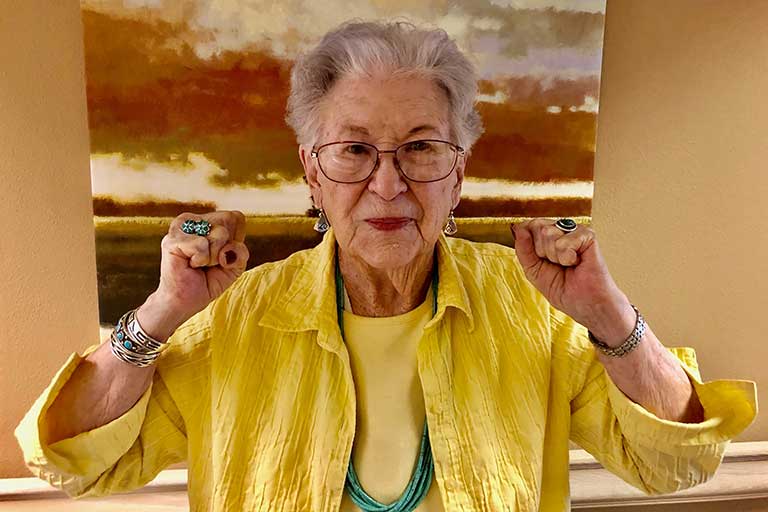Century Park Blog

Louise Estep has been a resident at The Bridge at Farmington for the past two years. She'll be celebrating her 96th birthday next month, saying she is determined to make it to 100. Two years ago, on Mother's Day, her daughter and son-in-law were on their way to visit when her life changed.
Louise found herself not able to get out of bed and was experiencing left-sided weakness. She was going in and out of consciousness. She had suffered from a stroke. Thankfully, her children had been on their way to celebrate her and were able to quickly take her to the hospital. This quick response saved her life.
She went through physical therapy and made her new home at The Bridge. She says her attitude helped in her recovery; she was determined to walk again. She now walks laps around The Bridge daily. She is very independent, saying she is truly thriving now in her new home.
She wants her story to give hope to others, as she was able to make a full recovery at age 93. She believes, "If this can help one person save their lives, then absolutely it is worth it all."
May is Stroke Awareness Month, and our Regional Director of Resident Care for the Mountain Region, Lori Follett, shared some ways to quickly recognize the signs of a stroke:
Stroke is a disease that affects the arteries leading to and within the brain. It is the Number 5 cause of death and a leading cause of disability in the United States. A stroke occurs when a blood vessel that carries oxygen and nutrients to the brain is either blocked by a clot or bursts (or ruptures). It is important to know the symptoms of stroke and what to do if you or someone near you is experiencing them. Use the acronym BE FAST to remember the signs of stroke.
BE FAST Reminder of Stroke Signs
B - Balance

Is the person suddenly having trouble with balance or coordination?
E - Eyes

Is the person experiencing sudden blurred or double vision or a sudden loss of vision in one or both eyes?
F - Face Drooping

Does one side of the face droop or is it numb? Ask the person to smile.
A - Arm Weakness

Is one arm weak or numb? Ask the person to raise both arms. Does one arm drift downward?
S - Speech Difficulty

Is speech slurred, are they unable to speak, or are they hard to understand? Ask the person to repeat a simple sentence like, "The sky is blue." Is the sentence repeated correctly?
T - Time to call 911

If the person shows any of these symptoms, even if the symptoms go away, call 911 and get them to the hospital immediately.
Source: American Stroke Association
We at Century Park Associates are proud to share Louise’s story, and we are lucky to have individuals such as Lori Follett who are passionate about our residents.



